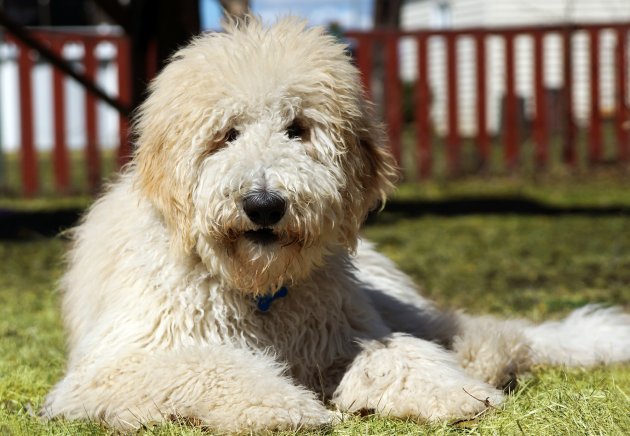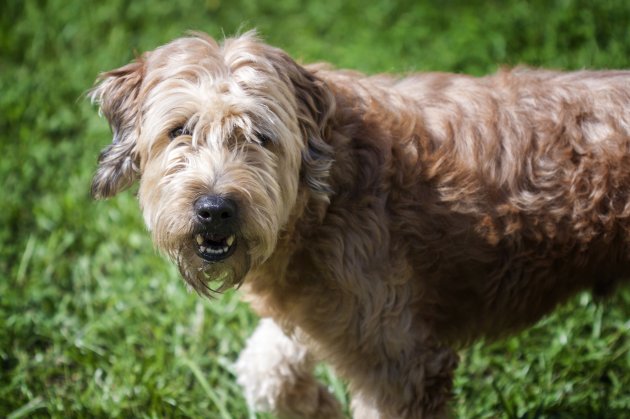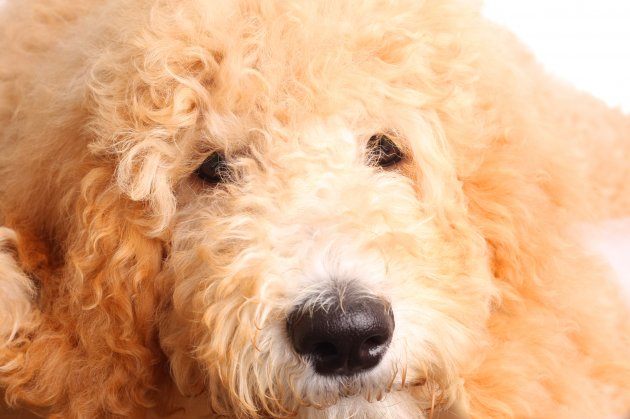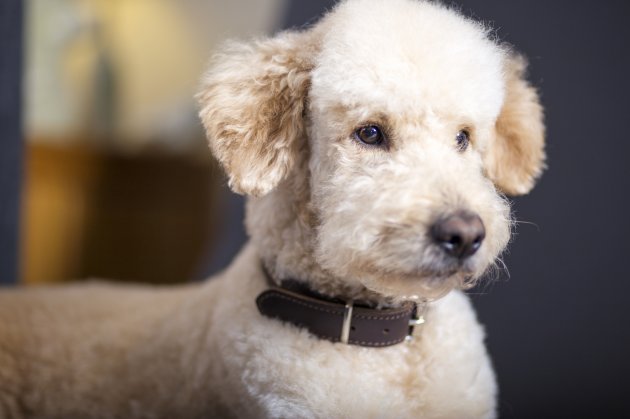Goldendoodles are exciting, social and outgoing dogs, with an uncanny ability to communicate with their owners. With their intelligence and temperament, they are ideally suited to be trained as guide dogs; plus they learn fast, making them an ideal indoor pet choice for younger couples and active families.
Goldendoodles are a designer breed, which means they were bred to acquire the good traits and appearances of both parents. They are a hybrid as a result of crossing a standard or miniature poodle with a Golden Retriever breed. It is assumed that a crossbreed acquires these traits from the parents.
As much as they are considered a hybrid, there is no guarantee that the Goldendoodle will inherit the lovable traits of both parents. Genes express themselves differently, especially when two different breeds are crossed. Keep this in mind before splashing some cash on a Goldendoodle you were assured is healthier and more hypoallergenic than a purebred. Some traits are out of a breeder's control.

What Does a Goldendoodle Look Like?
Distinctive features
Here are some of the Goldendoodle's features and traits at a glance;
- Intelligent, active and sweet
- Lean, long build
- Curly and long hair coat
- 15-24 inches tall, depending on the crossbreed
- Golden, white, gray, red, and cream-colored
- Weigh about 30 pounds
Coat and Color
Most Goldendoodles have shaggy, curly and long coats regardless of their sizes. These long and shaggy hairs require daily or weekly grooming and you should be ready for this task. The coat color ranges from golden, white, red, cream-colored to even black. Some Goldendoodles rock coats that are copper or apricot colored. One point to note is that these coats lighten as they age. The most common coat types in the Goldendoodle are the straight, wavy, and curly coat types. The straight coat in a Goldendoodle is flat and resembles the coat of a golden retriever. The wavy and curly coats resemble that of a standard and miniature poodle.
Goldendoodles are considered hypoallergenic since they don't shed dander (dead skin cells) making them a perfect choice for people with allergies. However, no reputable breeder can guarantee you that their dogs are 100% hypoallergenic since there is no scientific evidence that this dog breed is less allergenic than other dog breeds.
But, the Goldendoodles do not shed a lot. As such, they are a favorite of people who love pets, but hate their hair being all over the house.

Size and Weight
Most Goldendoodles vary in size, and it can be attributed to multigenerational breeding, where one Goldendoodle is crossed with the other. Goldendoodles can either be miniature, standard or large. Miniature Goldendoodles are a result of crossing a toy or miniature poodle with a golden retriever, and they usually measure 15-20 inches in height and weigh about 15-35 pounds. The standard Goldendoodle has a height of 17-20 inches and can weigh up to 50 pounds. Lastly, the large standard Goldendoodle measures 21-24 inches in height and can weigh 90 pounds.
Personality & Temperaments
Goldendoodles are highly affectionate, patient and gentle, that's what makes it a wonderful family pet since they enjoy human company. They don't like kennels much, so you should let them live with you indoors due to their friendly and accepting nature. The good news is that with proper training, these dogs can be obedient and loyal. They do have a playful trait though and can be mischievous depending on their mood.
You should also consider going for Goldendoodles with the right temperament which can be dependent on factors like training, heredity, and socialization. When choosing Goldendoodle dogs or puppies, go for the ones that are playful and curious, they should be willing to be approached and held by strangers. Shun puppies that hide in corners when approached by strangers or the ones that beat up their playmates, as they usually have a bad temperament. If you are unsure of how to go about it, visit the breeder and request to be shown the parents, relatives, and siblings of your puppy.

Find out their behavior and temperament, if you are comfortable with them, purchase the puppy. Meeting the parents of your puppy helps evaluate how your puppy will be like when it grows. Socialization helps the puppy become friendlier and accepting in nature and you should take it a notch higher by regularly inviting visitors over, taking your dog to busy parks, or even having strolls with your dog in residential areas for him to meet your neighbors, as it helps polish their social skills.
Health Concerns
Most Goldendoodles are healthy, and there is no reason to worry about them. But they can be prone to some health conditions, which cuts across all dog breeds. We feel that it's important for you to know some of these health conditions, in case you are considering purchasing this dog breed. Before purchasing a puppy, demand some health clearances from the breeder, especially on the puppy's parents. Most of these conditions are hereditary and can be genetically passed from the parent to the puppy. Here are some of the health conditions you should expect;
Ear infections – This infection is common in Goldendoodles due to their large floppy ears which may trap some moisture in the ear causing an ear and sinus infection. In this case, you should clean and check your dog's ears regularly. If the problem persists, seek the services of a vet.
Hip Dysplasia – This condition occurs when the thigh bone doesn't fit in the hip joint. Your dog will show signs of lameness and pain on both rear legs or just one leg, but some dogs may not display any of these signs. Hip Dysplasia is a genetic condition, passed on by parents to their puppies, though it might be as a result of malnutrition in some cases. You must ask the breeder for the health clearance certificates of the puppy's parents. Dogs with this condition should not be allowed to breed. Also, it is important to distinguish hip dysplasia from arthritis; especially when the dog ages. The only way to distinguish and diagnose the two health conditions is by having an X-ray screening on your dog.
Gastric Dilatation-Volvulus – This condition can be life-threatening to the large standard Goldendoodle. It is also known as bloat, and it occurs when the dog eats rapidly, drinks lots of water and exercises vigorously. GDV occurs when the bloated stomach twists rapidly causing pain to the dog. In severe cases, the dog will be unable to vomit or belch to get rid of the gas in the stomach, and this condition then impedes the normal flow of blood to the heart causing low blood pressure. In this case, seek medical attention immediately if you see the following signs;
- A distended stomach
- Excessive salivation
- Retching without throwing up
- Rapid heart rate
- Restlessness and weakness
Hypothyroidism -It occurs when your dog's thyroid gland is unable to function properly. It results in conditions such as obesity, lethargy, hyperpigmentation, pyoderma, epilepsy and hair loss (Alopecia). Always seek the services of a vet and give your dog a proper diet to mitigate this condition.
Progressive Retinal Atrophy – PRA is an eye disease that results in the deterioration of the retina, and your dog loses sight as the disease gradually progresses. The good news is that most affected dogs adapt well to their surroundings, especially if they become night-blind. This condition can be treated through surgery.
Elbow Dysplasia – It is a degenerative disease that causes a weakened and malformed joint. The most probable cause is abnormal growth and development. You should take your dog to a vet if it displays any signs of lameness, as it could result in arthritis in severe cases. The vet will recommend treatments like anti-inflammatory medication, surgery, and weight management.
Patellar Luxation – This condition is also known as slipped stifles, where the hind leg’s knee joint causes pain by sliding in and out of place. It can cripple your dog, though most dogs lead a normal life with this condition.
Von Willebrand Disease – It is a disorder that affects your dog's blood clotting process. The symptoms include;
- Bleeding gums
- Nosebleeds
- Prolonged bleeding in heat cycles and also from surgery
- Blood in stool
This condition can't be cured, but an early diagnosis can save your dog's life. It mostly occurs in dogs aged 3-5 years, so make sure you visit the vet, and they will commence treatment options such as blood transfusions, suturing and cauterizing injuries among other medications.

Maintenance
Grooming
The wavy curls on their coats require frequent grooming, though Goldendoodles are considered to be light shedders. Grooming helps keep the coat in top shape. For easier maintenance, you should consider clipping the coat. If clipped, the coat will require minimal grooming, say once every few weeks. If you leave the coat in its natural state, you have to brush it once every week.
It is advisable not to bathe your Goldendoodle dog unless it's necessary since the skin and the coat will lose moisture and natural oils, and it results in a bad coat appearance. Also, brush your dog's teeth three times a week to remove bacteria and tartar build-up, plus it also prevents bad breath and gum disease.
Don't forget to trim their nails at least twice a month to prevent problems like tears. The best sign that the nails are too long is when you hear them clicking on your floor. Note that toenails contain blood vessels, and they bleed if you cut them too short. Plus your dog will not cooperate next time you hold nail clippers, so if you can't trim the nails properly, seek the services of a vet or an experienced groomer. Also, when grooming, check for rashes, sores, inflammation, and infections on the feet and ears. The eyes should have no discharge or redness. These weekly examinations could help you diagnose various health conditions early.
Feeding
The amount of food your dog eats depends on factors like its size, build, activity level, age, and metabolism. Also, the food quality you feed your dog makes a difference. Highly nutritious food nourishes your dog. Experts recommend a daily food amount of 1-4 cups of dry food; feed your dog twice a day for best results and to prevent bloat. To ascertain whether your dog needs more exercise and less food, spread your hands on its rib area, and if you can't feel the ribs without pressing hard, give your dog less food. Also, consult your local vet on the best feeding guidelines for your dog.
Daily Exercise
Strictly speaking, most Goldendoodles require at least 20-30 minutes of vigorous exercise like running in your yard or even going for a walk to keep them from becoming bored. 12 miles of exercise is more than enough for your dog. Also, a Goldendoodle loves swimming and it can be a good opportunity for you to exercise your dog.
Housing
They require some space for them to move and play since some of them grow large. Don't house them in apartments or kennels, but opt for houses with fenced yards for them to run around. Also, a Goldendoodle suffers from separation anxiety when left alone for long periods, and it can lead to destructive behavior.
Training
Goldendoodles are highly trainable as they love to learn and are also eager to please their owners, and that's why they are used as service dogs. It is also the best for first-time owners. However, due to their social nature, don't physically punish your Goldendoodle, as it makes them incredibly distrusting and nervous. Always reward your dog when it does well in training, as they will be eager and willing to learn new tricks.
Goldendoodle is an ideal dog for you if;
- You enjoy going for outdoor activities like swimming, hiking, or camping and you also lead a fairly active lifestyle
- You are highly allergic to pet dander and fur
- You are interested in your dog's training and agility
- You have a family with young kids for the dogs to play and socialize with them
- You have the time and finances to commit to the regular grooming that the dog needs
- You are a single person and you need a companion
Take Away
Do you love the sound of a Goldendoodle and you are thinking about getting one? Goldendoodles are kind, gentle and intelligent, the perfect traits for a family dog. Plus they are good with kids and friendly with other household pets like cats. The average Goldendoodle has a lifespan of 10-16 years if you keep them healthy and well-groomed.
Anyone can raise a Goldendoodle dog breed and they are the best choice for first-time dog owners or families with kids.
Further reading and references:
- FAQ: Goldendoodles
- Goldendoodle Association of North America
- Alan Kenworthy (2015) Goldendoodles - The Owners Guide from Puppy to Old Age - Choosing, Caring for, Grooming, Health, Training and Understanding Your Goldendoodle Dog
- Linda Whitwam (2016) The Goldendoodle Handbook: The Essential Guide For New & Prospective Goldendoodle Owners